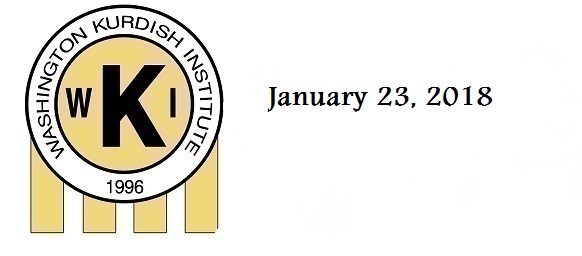1K
Iran
- Even after widespread anti-regime protests have quieted down in the face of a repressive government reaction, Iranian authorities continue to detain Kurdish activists in Iran, many of them students, who participated in the recent demonstrations. The Iranian government has signalled no intention of releasing many of these political prisoners. Some of these Kurdish detainees face death sentences for having voiced slogans against the Iranian theocracy and its Supreme Leader Ayatollah Khamenei. Within the past week, one Kurdish activist, Ghulam Raza Moahady, died after being tortured by the Kermanshah Etelaat (Iranian regime intelligence).
- After protesting the sexual assault of a 12-year-old schoolgirl in Orumiyeh, ten Kurdish protesters remain imprisoned by the Iranian regime after demanding justice for the girl and her family. The Iranian government has yet to determine the fate of most of these protesters, who, according to one recently released protester, are now being severely tortured while in prison. The protesters were demanding that Iranian authorities bring charges and adequately punish the girl’s school janitor who sexually assaulted her. The girl’s family took her to her doctor who then confirmed that the girl exhibited clear physical evidence of having been sexually assaulted.
Iraq
- A delegation from the Kurdistan Regional Government (KRG) visited Baghdad and held a meeting with Iraq’s Prime Minister Haider Al Abadi. The KRG delegation consisted of Prime Minister Nechirvan Barzani and his deputy Qubad Talabani. Participants at the meeting discussed the “political and security developments in the region and resolution of outstanding issues on the basis of the Iraqi Constitution,” according to a KRG statement. After the Baghdad visit, the KRG delegation visited Tehran, Iran and held meetings with Iranian regime officials, including Iran’s President Hassan Rouhani. According to the official KRG statement, “Iranian officials voiced their support to resolving the disputes between the Kurdistan Region and Iraqi authorities through dialogue and on the basis of the Iraqi Constitution.” The KRG-Baghdad meeting took place after a visit by Brett McGurk, the US Special Presidential Envoy for the Global Coalition to Counter ISIS, which focuses on building ties with both Baghdad and Erbil.
- The major political parties in the Kurdistan region were unable to come to an agreement on setting a date for the upcoming Presidential Election. While the election is set to take place sometime in September 2018, after the Parliamentary elections, the five major political parties in Iraqi Kurdistan could not agree on a specific date. The Iraqi Parliament approved national Parliamentary elections for May 12, 2018, despite objections from many Sunni Arab political parties and community leaders.
Syria
- Turkey’s President Recep Tayyip Erdogan made good on his numerous threats to attack the predominantly Kurdish city of Afrin in northwest Syria, as Turkish military forces began a bombing and invasion campaign on January 20th. Erdogan has named this preemptive military campaign “Operation Olive Branch.” Four days into the campaign, 18 civilians and three members of the U.S.-backed Syrian Democratic Forces (SDF) have been killed after Turkish forces, including 70 warplanes, bombed and attacked Afrin. The Turkish military is being accompanied by 25,000 Islamist Syrian militias, some affiliated with Al Qaeda, the Muslim Brotherhood, the Free Syrian Army, and other jihadi groups active in northwest Syria. U.S. Department of State Secretary Rex Tillerson expressed “concerns” over Turkey’s aggression. Meanwhile, after the urging of France, the United Nation Security Council held an urgent meeting to discuss Turkey’s attacks in Afrin. The meeting ended without any statements. The Syrian Kurds accused Russia of betrayal after the Putin regime brokered a deal with Turkey that allowed Erdogan’s forces to enter Russian-controlled airspace and territory in Syria. Prior to the attack, Russian military forces withdrew from Afrin and surrounding areas. With no strong reaction from the U.S. or other major powers, the SDF pleaded with Washington to stop Turkey’s unnecessary and brutal attack on Afrin. Kurdish officials in Syria , such as former Democratic Union Party (PYD) Co-Chair Saleh Moslem, called on the international community to do all it could to stop Turkey’s aggression and occupation. The Syrian Kurds announced that they would not participate in the upcoming Russia-sponsored Syria peace talks in Sochi–Russia.
Turkey
- After criticising the government’s military campaign against the Syrian Kurds, members of the People’s Democratic Party (HDP), a predominantly Kurdish political party in Turkey, were targeted for persecution and detention by Turkish officials. This clamp down targeted prominent HDP leaders such as Ayhan Bilgen and Deputy Co-Chair Nadir Yildirim. Erdogan had threatened the HDP earlier that he would retaliate against them if they were to criticize his military action in Syria. In the Kadikoy district in Istanbul, police detained 7 protesters after they were chanting slogans against Turkey’s incursion into Afrin. Turkish police also conducted raids against tens of social media activists and HDP members who criticized the government for its invasion of Afrin on their personal social media accounts. HDP Co-Chair Serpil Kemalbay released a statement saying: “This attack targets the bread of peoples. Children of the poor will be dragged into this war. This is an attack that is carried out in order to destroy the Kurdish people’s demand for freedom. This invasion attempt by the Erdoğan regime is unacceptable.”
- Turkish police briefly detained HDP lawmaker Osman Baydemir in Ankara. Baydemir has been detained by Turkish police several times in recent months for various offenses, such as “insulting the President” or for making pro-Kurdish public statements.

